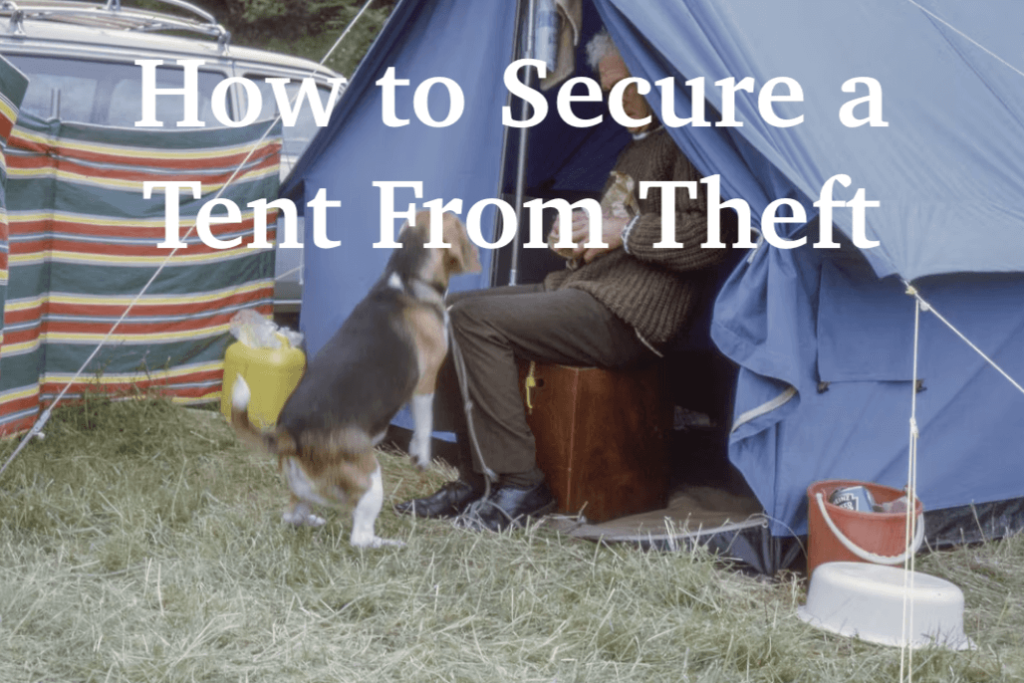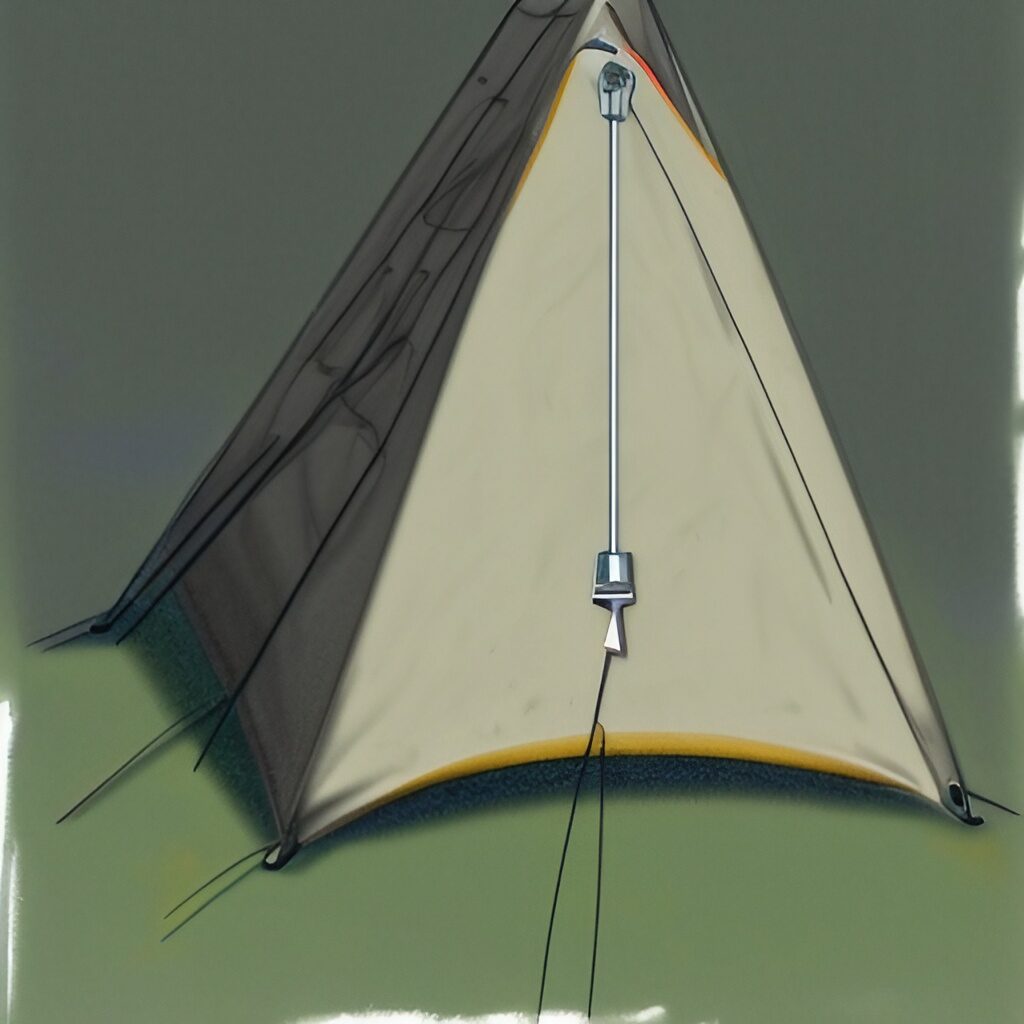
Campgrounds are pretty safe places, but you can never be certain they’re 100% secure. There can be people with bad intentions everywhere you go.
There are many more ways you can secure your valuables from theft, and I’ve done some research to provide you with a guide. You can lock a tent or secure your tent from theft by:
- Ways to Lock Your Tent – Securing Your Tent
- Is Locking Your Tent Worth It? – Securing Your Tent
- Tips to Secure Your Tent & Property – Securing Your Tent
- Choose A Popular Campground With Security – Tips to Secure Your Tent & Property
- Camp Near Others – Tips to Secure Your Tent & Property
- Avoid Vegetation – Tips to Secure Your Tent & Property
- Carry Your Valuables – Tips to Secure Your Tent & Property
- Utilize Your Car – Tips to Secure Your Tent & Property
- Lock Your Gear To Something Immovable – Tips to Secure Your Tent & Property
- Hide Your Valuables – Tips to Secure Your Tent & Property
- There’s Safety In Numbers – Tips to Secure Your Tent & Property
- Do Some Roleplay – Tips to Secure Your Tent & Property
- Be Prepared To Defend Yourself – Tips to Secure Your Tent & Property
- Defend Yourself From Wildlife – Tips to Secure Your Tent & Property
- Keep Things Illuminated – Tips to Secure Your Tent & Property
- Securing Your Tent – Conclusion
- Securing Your Tent – FAQs & Tips
Ways to Lock Your Tent – Securing Your Tent
How to Lock a Tent With A Padlock – Ways to Lock Your Tent
Unfortunately, it’s not common to lock your tent with a padlock, but it’s definitely doable. You’ll need a very small padlock for this, so consider one you might use on a suitcase. Locks like this one are around the right size.
I’ve recommended a combination lock here, because a key with a lock can stress you out as you have to remember to bring your key everywhere. However, I’d avoid using a combination lock in winter.
I’ve had several combination locks stiffen and become unusable due to cold in fall and winter, so bring a padlock with a key during these seasons. Bringing some WD40 on your trip will also ensure your lock remains easy to use.
Once you’ve selected your lock, using it couldn’t be simpler.
- Ensure your tent has two zippers on the main door
- Put the zippers next to each other inside the tent
- Loop the padlock through the holes in the zippers, making the tent impossible to unzip
- Lock your padlock; keep a key on your person at all times, or make it easy to enter the combination on your combination lock
You can also do the above on the outside of your tent when you’re away.
If you can’t find a padlock that will fit with your zippers, then you can make your own method of locking zippers. The video below will show you how:
How to Lock Your Tent With a Shoelace – Ways to Lock Your Tent
This method can be slightly tricker if you’re not great with knots, but it’s worth it, and it’s easy to get the hang of it.
- Draw the inside zippers together
- Pull a shoelace through the hole in the shoelaces until you have a piece of lace the same length in each hand
- Tie a simple knot like you would when tying your shoes; this is so you can leave the tent fast in an emergency
You can tie a more complex knot if you wish.
This tent-locking solution is as easy as it sounds, and it’s a great alternative to using a padlock inside when you can’t find a padlock small enough for the job. Plus, most people always have at least one shoelace they can use.
String, yarn, or anything similar to a shoelace also work for this.
Is Locking Your Tent Worth It? – Securing Your Tent
Locking your tent can give you great peace of mind, but your tent isn’t made of steel. Anyone with a knife can still break and enter—though bear in mind, people at well-equipped, non-wilderness sites are less likely to carry knives.
Plus, people want an easy target. If they can’t unzip your tent on the first try or you start screaming for help, then they’ll probably move on to someone else.
There are a few other ways to ensure you keep your tent and your gear are secure, though.
Tips to Secure Your Tent & Property – Securing Your Tent
Choose A Popular Campground With Security – Tips to Secure Your Tent & Property
The best way to avoid potential theft is to choose somewhere that’s likely to be safe. That’s why picking a common campground is a good idea.
First of all, you won’t be fully in the wilderness where people can sneak up on you more easily. Plus, in the wilderness, people are likely to carry pocket knives for collecting kindling and dealing with food.
More popular campgrounds usually have more security. There may be cameras, park rangers and other authority figures around.
Make sure you research your chosen campground before you attend, and check out what security measures they have in place. Check if crime is common at the campgrounds, and make sure the facilities look high-quality and like they’d attract well-meaning campers.
A lot of gut judgment goes into the research. You know in your heart what screams “safe place!” to you. So, go with your instincts, and find somewhere you know you’ll feel safe, comfortable, and watched over.
Camp Near Others – Tips to Secure Your Tent & Property
Some campgrounds will be too crowded to let you pick your own site, but if you can select where you camp, select somewhere around other people. Having campers nearby in all directions means you’ll have more witnesses in case someone wants to do something malicious.
I know you may not want to be too close to some strangers, and that’s fine, but in my opinion, safety is more important than total isolation during your camping experience.
If you keep the noise levels down and don’t leave your gear or trash on their site, then you should have no problems and your site neighbors won’t bother you.
Do stuff like learning how to quiet a generator, don’t play music loudly at night, and don’t let your campfire smoke in their direction. You’re practically guaranteed a pleasant experience.
Speaking of campfire smoke—here’s why campfire smoke follows you and how to prevent it, and here’s how to make smokeless fire.
Avoid Vegetation – Tips to Secure Your Tent & Property
Camping near trees and bushes can make it harder to see people coming. Lots of sites are surrounded by vegetation, though, and that’s a real bummer if you want to keep the area around you highly visible.
Camp on the edge of your site that’s furthest from trees and bushes. This will make it easy to spot anyone approaching your tent.
Carry Your Valuables – Tips to Secure Your Tent & Property
These days, having valuables on your camping trip is unavoidable. Phones, smartwatches, chargers, and more will probably be with you on every camping trip.
It’s tempting to leave this stuff in your tent when you head out to hike or do some other activity, but I’d highly recommend against it. Keeping your valuables on your person is a guaranteed way to keep them safe.
Put them in a waterproof bag in your pocket if you must, but keep them with you.
Utilize Your Car – Tips to Secure Your Tent & Property
People are way, way, way less likely to break into a car than a tent while camping. If you can’t carry your valuables or you just don’t want to, then keep them in your car! It’s a super easy solution if your car is near your site.
Lock Your Gear To Something Immovable – Tips to Secure Your Tent & Property
If you want to be truly certain people can’t steal your gear, lock it up. Secure it to a tree, bench pole, fence, or another immovable object.
It’s simple to loop a bike lock through the handle of a backpack and then around an object. However, doing this is like a sign flashing and pointing at your gear saying, “THERE’S SOMETHING WORTH STEALING IN HERE!”
Look for a Pacsafe Bag Protector to ensure nobody can steal your bag or any other item they could easily cut and run off with. Remember to lock all your bags shut with little padlocks, too.
Hide Your Valuables – Tips to Secure Your Tent & Property
You might think it’s safe to leave your valuables on your tent floor or in the accessory pockets on the wall. This is a mistake. If you have to leave your gear in your tent, hide it.
Roll tech items up in your sleeping bag when stowing them away. Hide jewelry in your rolled-up socks. And a book safe is another great way to keep all manner of small objects hidden away.
If you position the safe in your tent in a way that hides the combination lock, then thieves won’t look twice at it.
There’s Safety In Numbers – Tips to Secure Your Tent & Property
Avoiding leaving your tent alone will help you avoid theft. Camp in a large group, and make sure there’s always at least one person in your tent while the rest of you are away. Take it in turns to keep watch!
Having an intimidating-looking person in your party can also help deter thieves. Nobody wants to steal from a group of campers that contains a burly man with a constantly-furrowed brow (even if he’s a sweetheart in reality).
Do Some Roleplay – Tips to Secure Your Tent & Property
Even if you’re not leaving someone behind in your tent, pretend you are! Call goodbye to an invisible person when you leave. Leave a device playing music or Netflix in your tent while you’re out.
If it’s nighttime, leave a night light on to make people think you’re still awake. Do whatever it takes to act like someone is awake in your tent at all times.
Be Prepared To Defend Yourself – Tips to Secure Your Tent & Property
A tiny number of thieves may be willing to hurt you to get what you want. It’s uncommon, and you’ll probably never experience it, but it’s better to be prepared anyway.
Learn some basic self-defense that’ll help you in a fight, and keep something blunt in your tent. Don’t carry weapons—it’s often illegal and against the rules on most campgrounds—but a blunt object that’ll knock someone out when needed is good to have on hand.
Defend Yourself From Wildlife – Tips to Secure Your Tent & Property
People aren’t the only thing you have to worry about. Bears and other wildlife would love to get their hands on your food.
Now, are tents safe from bears? Usually, but make sure you store food and scented items in scent-proof bags and always carry bear spray just in case.
Keep Things Illuminated – Tips to Secure Your Tent & Property
Keeping your campsite lit up will help you see potential thieves and deter them. It’s easier to attack in the dark.
Stay close to your tent, and consider these campsite and tent lighting ideas to illuminate the area in a fun way that keeps you happy as well as safe.
Securing Your Tent – Conclusion
Finding ways to feel a little more secure is easy once you employ the tips in these articles. Being smart with storing your gear is the best way to ensure it stays safe.
Never leave anything lying around on your campsite, and keep your tent secure while you’re away from it. This will give you the best chances of leaving your camping trip with your gear and valuables intact.

Securing Your Tent – FAQs & Tips
Preparing for Severe Weather – FAQs & Tips
Severe weather can pose a significant risk to your tent and your safety while camping. Here are some tips for preparing your tent for severe weather:
- Check the forecast: Before heading out on your camping trip, check the weather forecast for the area where you will be camping. Be aware of any potential storms or severe weather that may be expected.
- Secure the tent: Use extra stakes and guylines to secure the tent to the ground. This can help to prevent it from collapsing or blowing away in high winds. Make sure the stakes are driven into the ground securely and the guylines are attached tightly to the tent.
- Consider taking the tent down: If severe weather is expected, consider taking the tent down and seeking shelter in a more sturdy structure. This can help to prevent damage to the tent and ensure your safety in extreme weather conditions.
- Use a rainfly: A rainfly can help to protect your tent from rain and wind, which can help to prevent damage to the tent and keep you dry. Make sure the rainfly is properly secured to the tent and pulled taut to prevent water from pooling on the tent roof.
- Stay away from trees and other hazards: During severe weather, it’s important to avoid camping near trees or other hazards that could fall or collapse in high winds. Find a location that is sheltered and away from any potential dangers.
- Store gear properly: Make sure any gear or equipment that is stored outside of the tent is securely fastened and covered. This can help to prevent damage or loss in high winds or heavy rain.
- Be prepared for emergencies: In case of emergency, make sure you have a plan in place and that everyone in your camping group knows what to do. Have a first-aid kit on hand, a way to call for help, and a plan for evacuating the area if necessary.
By taking these precautions, you can help to prepare your tent for severe weather and ensure your safety while camping. Always keep an eye on the weather forecast and be prepared to take action if severe weather is expected.
Marking Your Tent – FAQs & Tips
Marking your tent with your name or contact information can be a useful way to deter theft and increase the chances of recovering your tent if it is lost or stolen. Here are some tips for marking your tent:
- Use a waterproof marker: Choose a waterproof marker or pen to mark your tent, as this will ensure that the markings stay visible even in wet conditions.
- Write your name and contact information: Write your name, phone number, and any other identifying information on the tent in a visible location. This can help to deter thieves and increase the chances of recovering your tent if it is lost or stolen.
- Use a contrasting color: Use a color that contrasts with the color of your tent to make the markings more visible. For example, if your tent is green, use a white or silver marker to mark your tent.
- Mark both the tent and the rainfly: Mark both the tent and the rainfly if your tent has one, as this can help to increase the visibility of the markings.
- Don’t mark over seams or zippers: Avoid marking over seams or zippers, as this can make the markings difficult to read or remove.
- Check the markings regularly: Check the markings on your tent regularly to ensure they are still visible and legible. If they start to fade or become illegible, consider re-marking the tent.
By marking your tent with your name and contact information, you can help to deter theft and increase the chances of recovering your tent if it is lost or stolen. Always be sure to check the rules and regulations of the campground or park you are visiting, as some may have restrictions on marking or labeling tents.
What Should You do if You Suspect Your Tent was Burglarized? – FAQs & Tips
If you suspect that your tent has been burglarized, here are some steps you can take:
- Check your tent: Start by checking your tent to see if anything is missing or if any damage has been done. Look for any signs of forced entry, such as a cut or ripped tent door or window.
- Notify campground staff or park rangers: If you are camping in a public campground or park, notify the staff or rangers immediately. They can help you file a report and may be able to assist with the investigation.
- Call the police: If you believe that a crime has been committed, contact the local police. Provide them with as much information as possible, including a description of the stolen items and any suspicious activity you may have witnessed.
- Document the incident: Take photos of any damage to your tent and any missing items. Keep a list of the stolen items and their value. This information may be useful when filing a police report or making an insurance claim.
- Secure your belongings: If you are able to continue camping, secure your belongings as best as possible. Lock valuables in a car or other secure location, and consider using a tent lock to secure the tent.
- File an insurance claim: If you have renter’s or homeowner’s insurance, you may be able to file a claim for the stolen items. Contact your insurance provider for more information.
By taking these steps, you can help to increase the chances of recovering your stolen items and may be able to receive compensation for any losses you may have incurred. It’s always important to take precautions to secure your tent and belongings, but in the event of theft or burglary, it’s important to take quick action to protect yourself and your property.
If Theft Occurred in Your Tent, are the Chances of Finding the Culprit Good? – FAQs & Tips
Unfortunately, the chances of finding the culprit after a theft has occurred in a camping area, such as a tent burglary, are usually low. In many cases, campers who witness suspicious activity may not report it immediately, and law enforcement may not be able to respond quickly enough to apprehend the thief.
Furthermore, in many camping areas, there may be limited security measures in place, which can make it easier for thieves to operate undetected. For example, many campsites do not have surveillance cameras or security personnel patrolling the area.
However, if you report the theft to the appropriate authorities, such as campground staff or law enforcement, they may be able to investigate the incident and collect evidence that could help identify the thief. It’s important to provide as much information as possible, such as a description of the stolen items and any suspicious activity you may have witnessed.
In addition, it’s always a good idea to take precautions to secure your tent and belongings, such as using a tent lock, storing valuables out of sight, and marking your tent with identifying information. These measures may deter thieves or increase the chances of recovering stolen items.
Overall, while the chances of finding the culprit after a tent burglary may be low, taking quick action to report the incident and secure your belongings can help protect yourself and prevent future thefts.














